Knowledge Management in UAE Engineering and Biotech: A Research Report
VerifiedAdded on 2023/01/11
|10
|2159
|48
Report
AI Summary
This research report examines knowledge management (KM) practices within the engineering and biotechnology industries, based on a chosen research paper. The report analyzes the application of KM in the United Arab Emirates' engineering sector, revealing a lack of KM culture and KM officers, along with interdepartmental conflicts hindering KM promotion. Conversely, the biotechnology industry demonstrates effective knowledge-based marketing and innovation. The report delves into the research methods, findings, and challenges highlighted in the original article, concluding that biotechnology firms are more advanced in managing knowledge, particularly in driving marketing activities and innovation. The study found that the engineering industry has a few problems with respect to knowledge management and the biotechnology industry is doing well to manage the knowledge. The report also discusses the implications for the student's software studies, emphasizing the importance of KM and information sharing for effective learning and innovation.
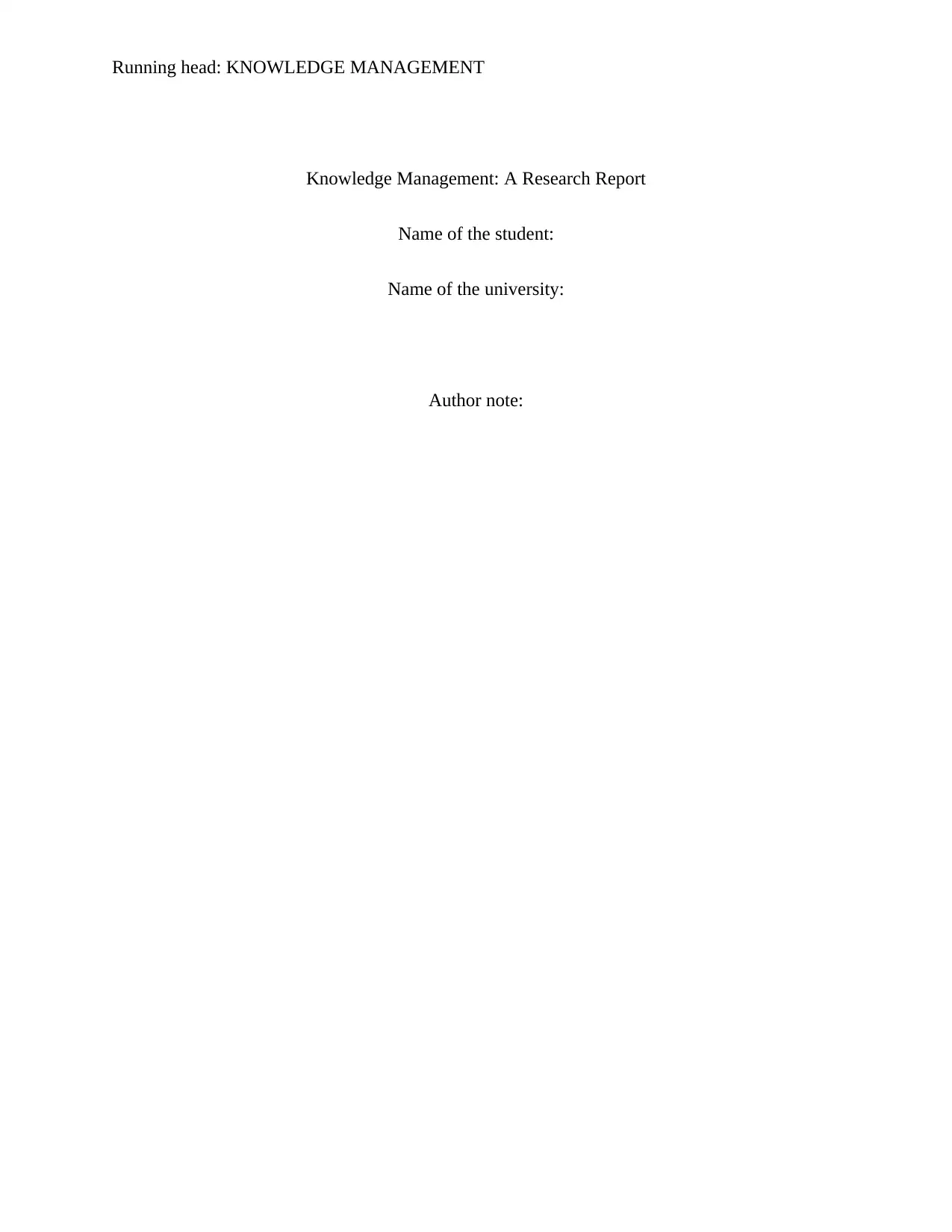
Running head: KNOWLEDGE MANAGEMENT
Knowledge Management: A Research Report
Name of the student:
Name of the university:
Author note:
Knowledge Management: A Research Report
Name of the student:
Name of the university:
Author note:
Paraphrase This Document
Need a fresh take? Get an instant paraphrase of this document with our AI Paraphraser
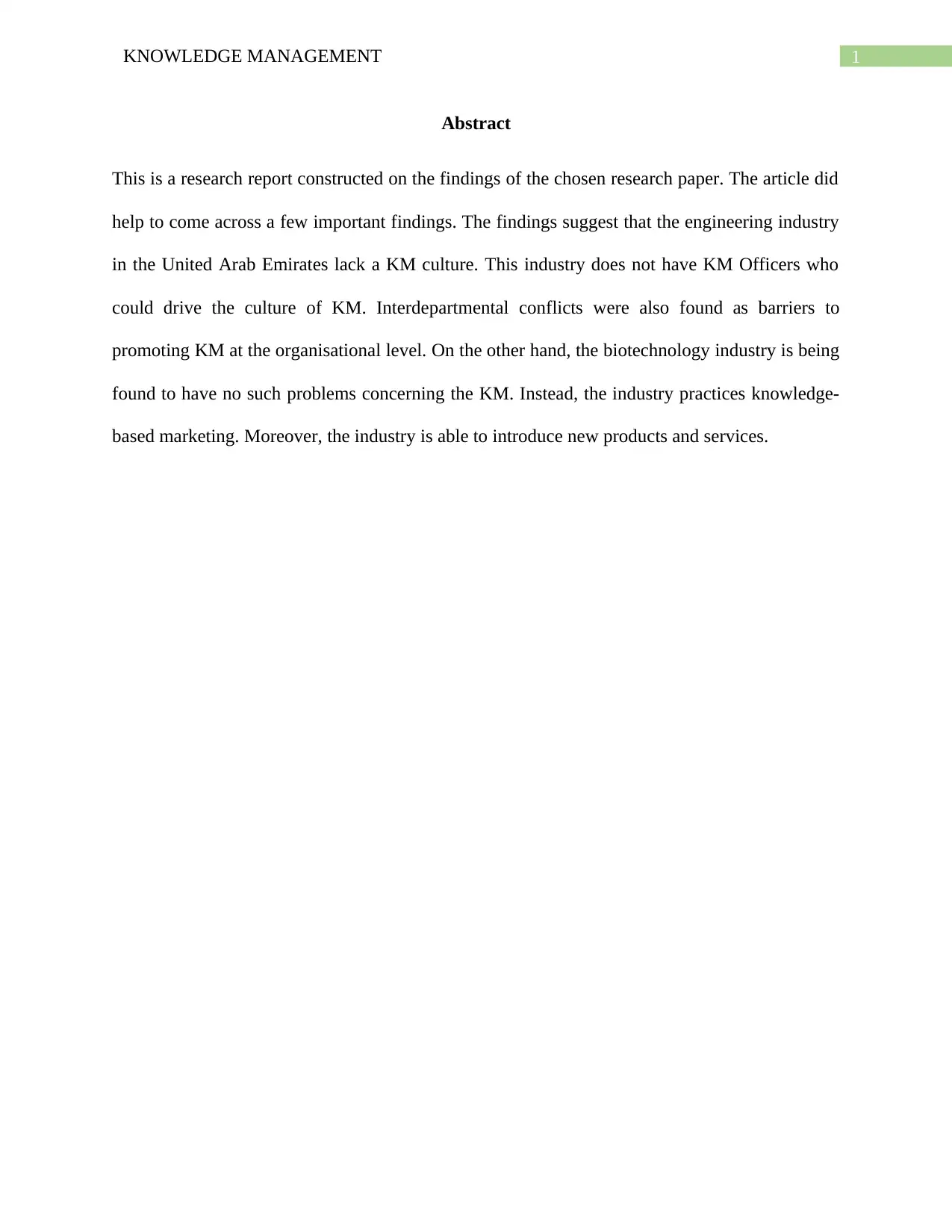
1KNOWLEDGE MANAGEMENT
Abstract
This is a research report constructed on the findings of the chosen research paper. The article did
help to come across a few important findings. The findings suggest that the engineering industry
in the United Arab Emirates lack a KM culture. This industry does not have KM Officers who
could drive the culture of KM. Interdepartmental conflicts were also found as barriers to
promoting KM at the organisational level. On the other hand, the biotechnology industry is being
found to have no such problems concerning the KM. Instead, the industry practices knowledge-
based marketing. Moreover, the industry is able to introduce new products and services.
Abstract
This is a research report constructed on the findings of the chosen research paper. The article did
help to come across a few important findings. The findings suggest that the engineering industry
in the United Arab Emirates lack a KM culture. This industry does not have KM Officers who
could drive the culture of KM. Interdepartmental conflicts were also found as barriers to
promoting KM at the organisational level. On the other hand, the biotechnology industry is being
found to have no such problems concerning the KM. Instead, the industry practices knowledge-
based marketing. Moreover, the industry is able to introduce new products and services.
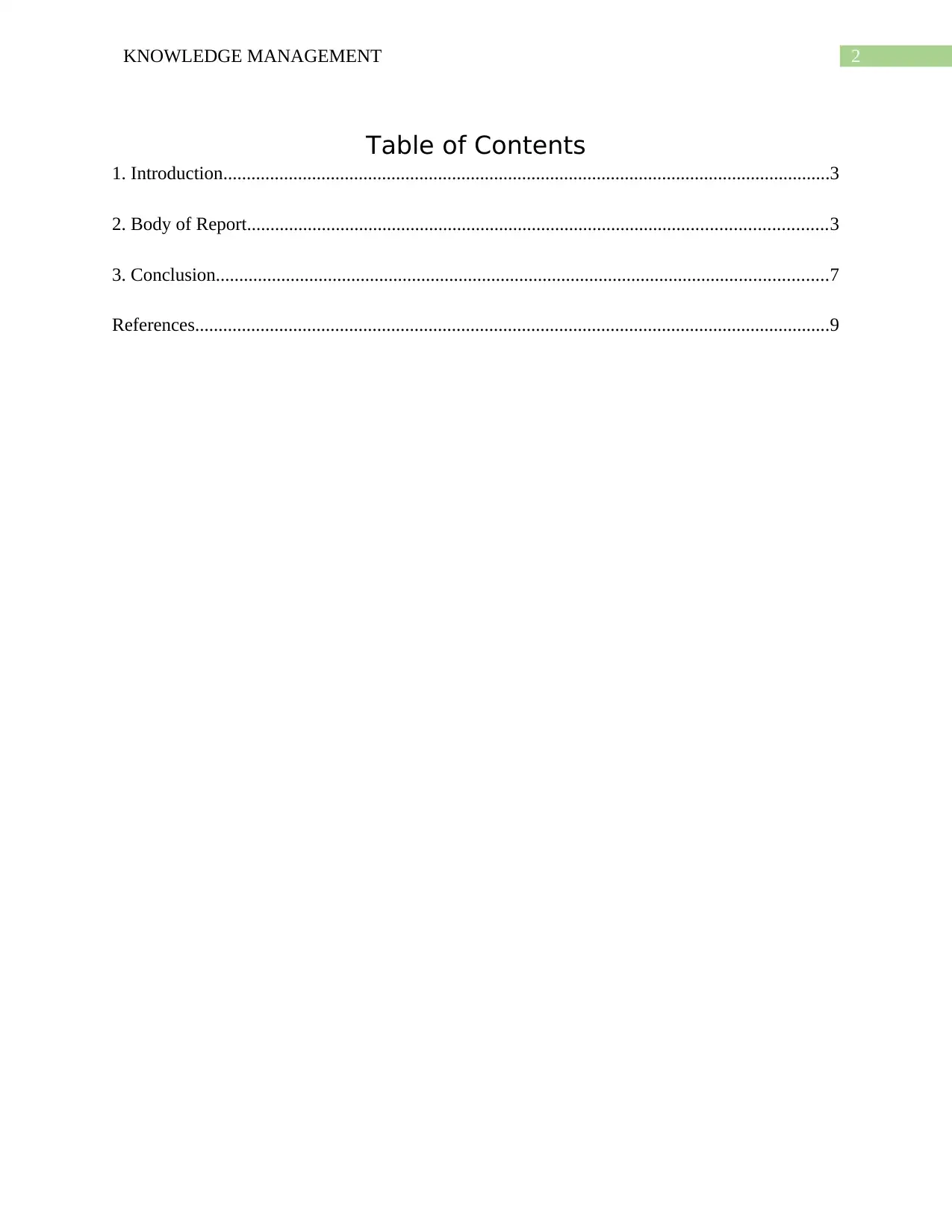
2KNOWLEDGE MANAGEMENT
Table of Contents
1. Introduction..................................................................................................................................3
2. Body of Report............................................................................................................................3
3. Conclusion...................................................................................................................................7
References........................................................................................................................................9
Table of Contents
1. Introduction..................................................................................................................................3
2. Body of Report............................................................................................................................3
3. Conclusion...................................................................................................................................7
References........................................................................................................................................9
⊘ This is a preview!⊘
Do you want full access?
Subscribe today to unlock all pages.

Trusted by 1+ million students worldwide
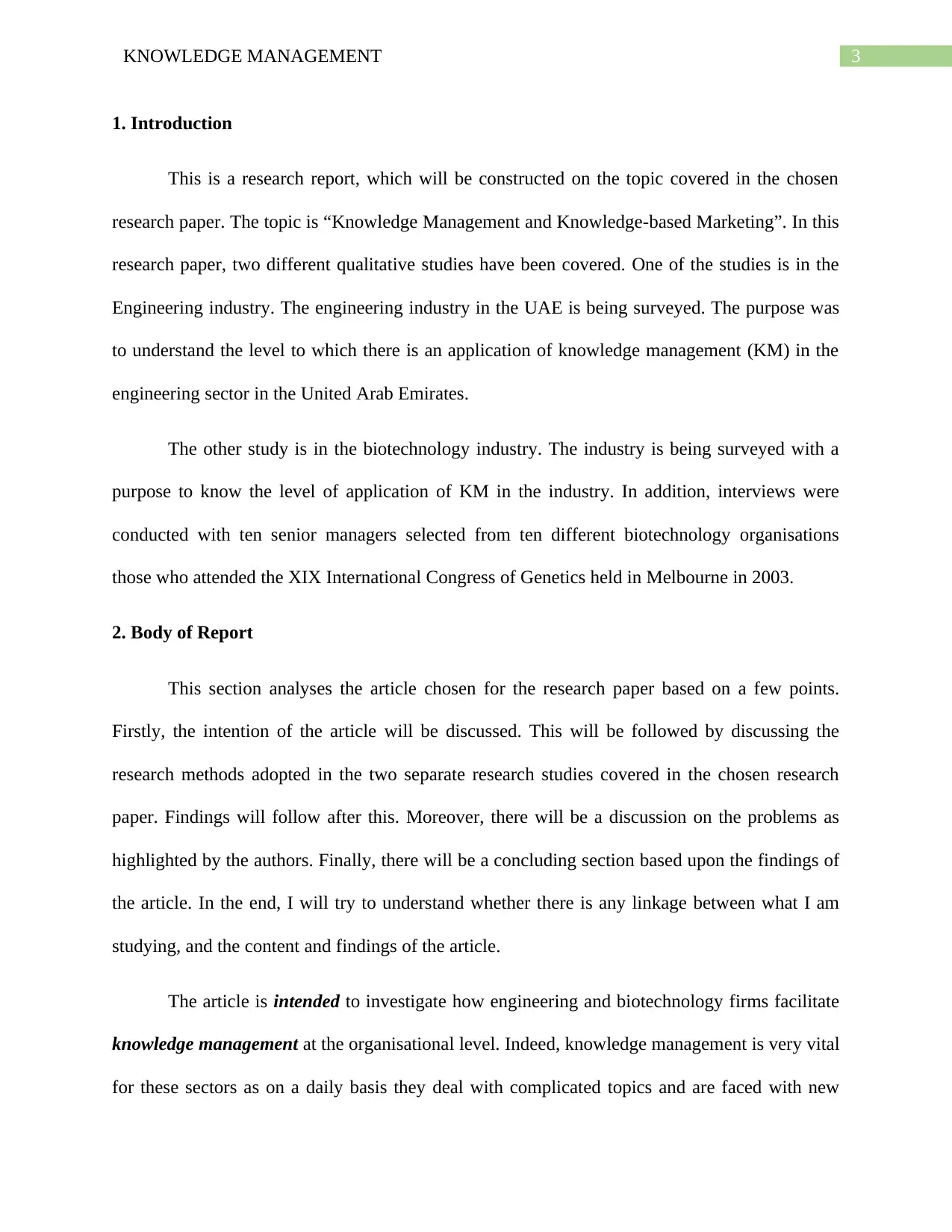
3KNOWLEDGE MANAGEMENT
1. Introduction
This is a research report, which will be constructed on the topic covered in the chosen
research paper. The topic is “Knowledge Management and Knowledge-based Marketing”. In this
research paper, two different qualitative studies have been covered. One of the studies is in the
Engineering industry. The engineering industry in the UAE is being surveyed. The purpose was
to understand the level to which there is an application of knowledge management (KM) in the
engineering sector in the United Arab Emirates.
The other study is in the biotechnology industry. The industry is being surveyed with a
purpose to know the level of application of KM in the industry. In addition, interviews were
conducted with ten senior managers selected from ten different biotechnology organisations
those who attended the XIX International Congress of Genetics held in Melbourne in 2003.
2. Body of Report
This section analyses the article chosen for the research paper based on a few points.
Firstly, the intention of the article will be discussed. This will be followed by discussing the
research methods adopted in the two separate research studies covered in the chosen research
paper. Findings will follow after this. Moreover, there will be a discussion on the problems as
highlighted by the authors. Finally, there will be a concluding section based upon the findings of
the article. In the end, I will try to understand whether there is any linkage between what I am
studying, and the content and findings of the article.
The article is intended to investigate how engineering and biotechnology firms facilitate
knowledge management at the organisational level. Indeed, knowledge management is very vital
for these sectors as on a daily basis they deal with complicated topics and are faced with new
1. Introduction
This is a research report, which will be constructed on the topic covered in the chosen
research paper. The topic is “Knowledge Management and Knowledge-based Marketing”. In this
research paper, two different qualitative studies have been covered. One of the studies is in the
Engineering industry. The engineering industry in the UAE is being surveyed. The purpose was
to understand the level to which there is an application of knowledge management (KM) in the
engineering sector in the United Arab Emirates.
The other study is in the biotechnology industry. The industry is being surveyed with a
purpose to know the level of application of KM in the industry. In addition, interviews were
conducted with ten senior managers selected from ten different biotechnology organisations
those who attended the XIX International Congress of Genetics held in Melbourne in 2003.
2. Body of Report
This section analyses the article chosen for the research paper based on a few points.
Firstly, the intention of the article will be discussed. This will be followed by discussing the
research methods adopted in the two separate research studies covered in the chosen research
paper. Findings will follow after this. Moreover, there will be a discussion on the problems as
highlighted by the authors. Finally, there will be a concluding section based upon the findings of
the article. In the end, I will try to understand whether there is any linkage between what I am
studying, and the content and findings of the article.
The article is intended to investigate how engineering and biotechnology firms facilitate
knowledge management at the organisational level. Indeed, knowledge management is very vital
for these sectors as on a daily basis they deal with complicated topics and are faced with new
Paraphrase This Document
Need a fresh take? Get an instant paraphrase of this document with our AI Paraphraser
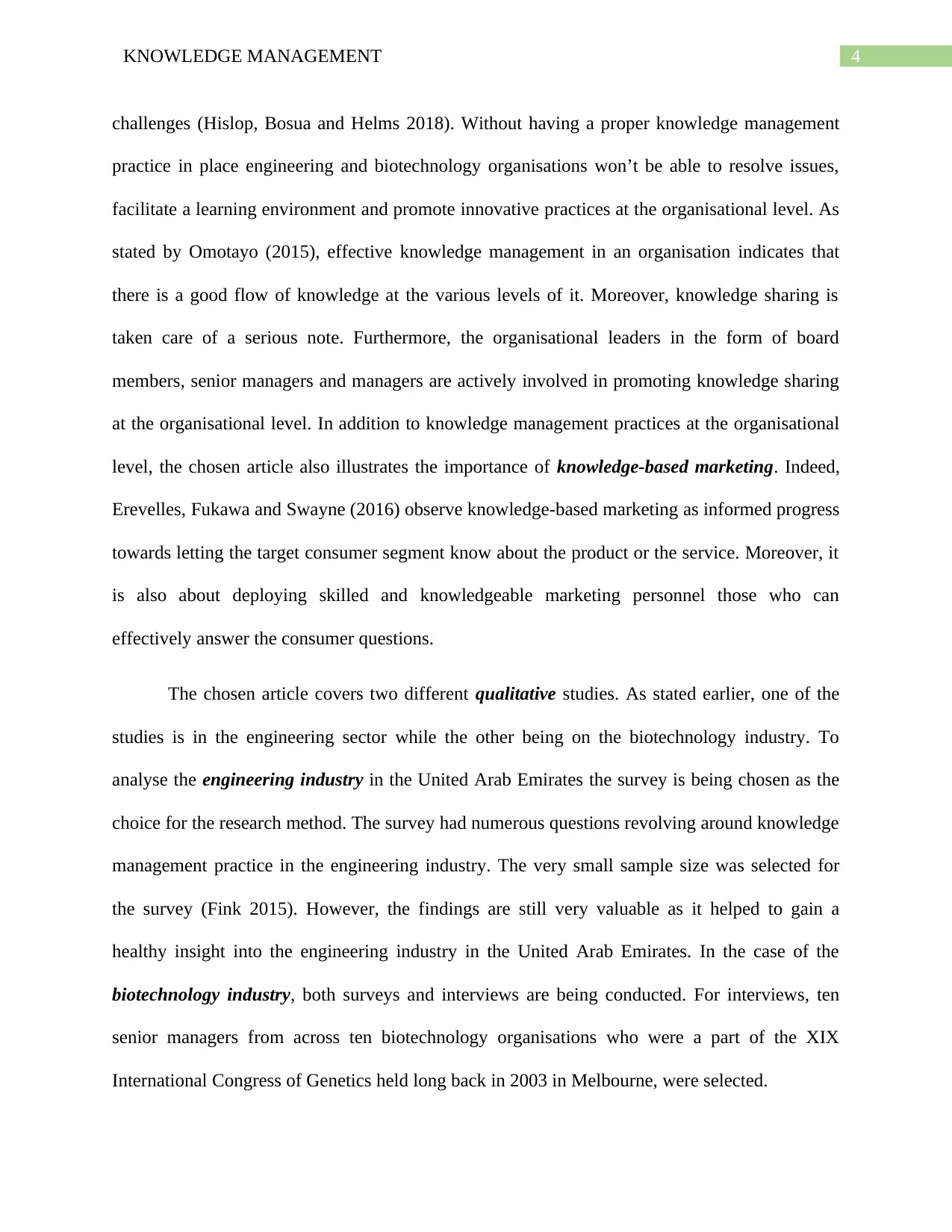
4KNOWLEDGE MANAGEMENT
challenges (Hislop, Bosua and Helms 2018). Without having a proper knowledge management
practice in place engineering and biotechnology organisations won’t be able to resolve issues,
facilitate a learning environment and promote innovative practices at the organisational level. As
stated by Omotayo (2015), effective knowledge management in an organisation indicates that
there is a good flow of knowledge at the various levels of it. Moreover, knowledge sharing is
taken care of a serious note. Furthermore, the organisational leaders in the form of board
members, senior managers and managers are actively involved in promoting knowledge sharing
at the organisational level. In addition to knowledge management practices at the organisational
level, the chosen article also illustrates the importance of knowledge-based marketing. Indeed,
Erevelles, Fukawa and Swayne (2016) observe knowledge-based marketing as informed progress
towards letting the target consumer segment know about the product or the service. Moreover, it
is also about deploying skilled and knowledgeable marketing personnel those who can
effectively answer the consumer questions.
The chosen article covers two different qualitative studies. As stated earlier, one of the
studies is in the engineering sector while the other being on the biotechnology industry. To
analyse the engineering industry in the United Arab Emirates the survey is being chosen as the
choice for the research method. The survey had numerous questions revolving around knowledge
management practice in the engineering industry. The very small sample size was selected for
the survey (Fink 2015). However, the findings are still very valuable as it helped to gain a
healthy insight into the engineering industry in the United Arab Emirates. In the case of the
biotechnology industry, both surveys and interviews are being conducted. For interviews, ten
senior managers from across ten biotechnology organisations who were a part of the XIX
International Congress of Genetics held long back in 2003 in Melbourne, were selected.
challenges (Hislop, Bosua and Helms 2018). Without having a proper knowledge management
practice in place engineering and biotechnology organisations won’t be able to resolve issues,
facilitate a learning environment and promote innovative practices at the organisational level. As
stated by Omotayo (2015), effective knowledge management in an organisation indicates that
there is a good flow of knowledge at the various levels of it. Moreover, knowledge sharing is
taken care of a serious note. Furthermore, the organisational leaders in the form of board
members, senior managers and managers are actively involved in promoting knowledge sharing
at the organisational level. In addition to knowledge management practices at the organisational
level, the chosen article also illustrates the importance of knowledge-based marketing. Indeed,
Erevelles, Fukawa and Swayne (2016) observe knowledge-based marketing as informed progress
towards letting the target consumer segment know about the product or the service. Moreover, it
is also about deploying skilled and knowledgeable marketing personnel those who can
effectively answer the consumer questions.
The chosen article covers two different qualitative studies. As stated earlier, one of the
studies is in the engineering sector while the other being on the biotechnology industry. To
analyse the engineering industry in the United Arab Emirates the survey is being chosen as the
choice for the research method. The survey had numerous questions revolving around knowledge
management practice in the engineering industry. The very small sample size was selected for
the survey (Fink 2015). However, the findings are still very valuable as it helped to gain a
healthy insight into the engineering industry in the United Arab Emirates. In the case of the
biotechnology industry, both surveys and interviews are being conducted. For interviews, ten
senior managers from across ten biotechnology organisations who were a part of the XIX
International Congress of Genetics held long back in 2003 in Melbourne, were selected.
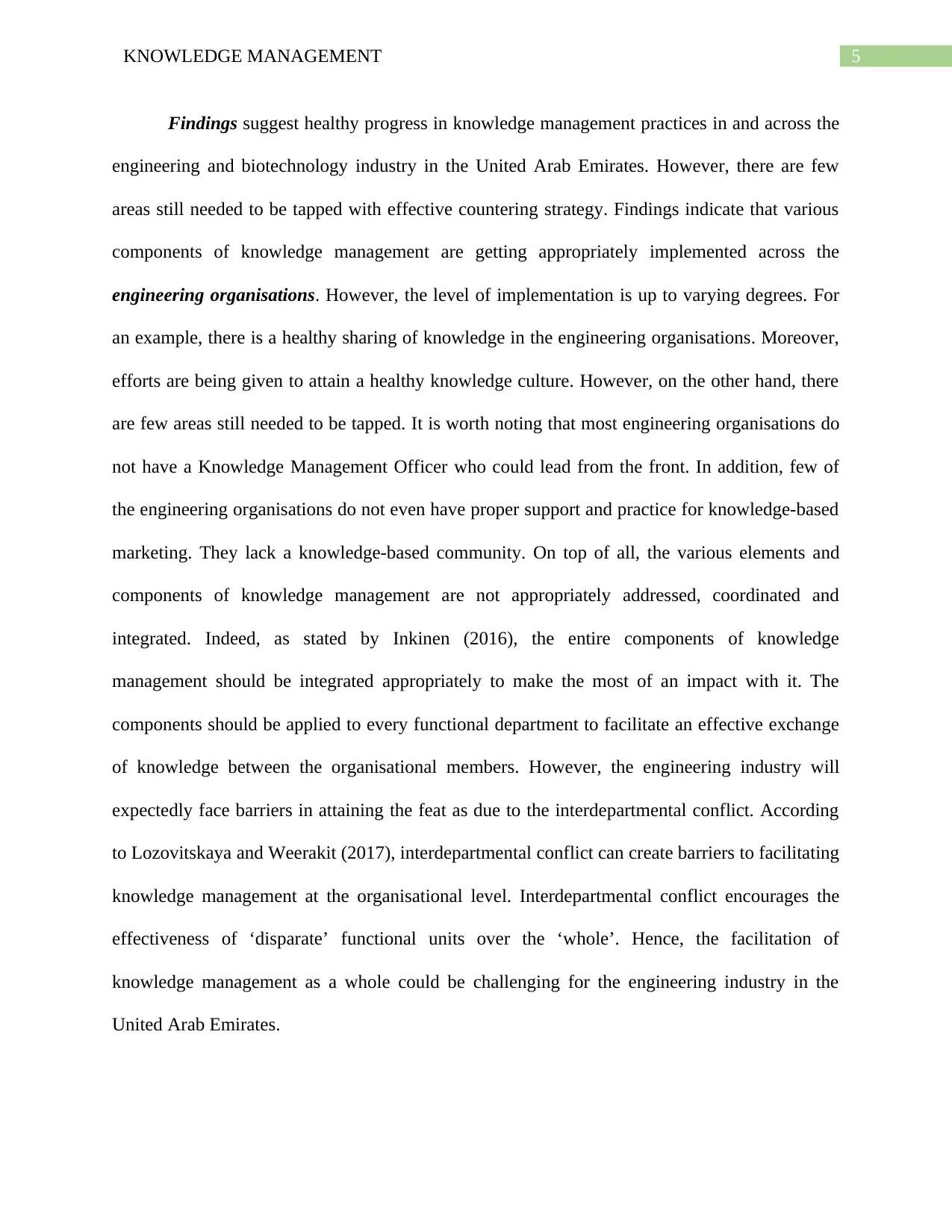
5KNOWLEDGE MANAGEMENT
Findings suggest healthy progress in knowledge management practices in and across the
engineering and biotechnology industry in the United Arab Emirates. However, there are few
areas still needed to be tapped with effective countering strategy. Findings indicate that various
components of knowledge management are getting appropriately implemented across the
engineering organisations. However, the level of implementation is up to varying degrees. For
an example, there is a healthy sharing of knowledge in the engineering organisations. Moreover,
efforts are being given to attain a healthy knowledge culture. However, on the other hand, there
are few areas still needed to be tapped. It is worth noting that most engineering organisations do
not have a Knowledge Management Officer who could lead from the front. In addition, few of
the engineering organisations do not even have proper support and practice for knowledge-based
marketing. They lack a knowledge-based community. On top of all, the various elements and
components of knowledge management are not appropriately addressed, coordinated and
integrated. Indeed, as stated by Inkinen (2016), the entire components of knowledge
management should be integrated appropriately to make the most of an impact with it. The
components should be applied to every functional department to facilitate an effective exchange
of knowledge between the organisational members. However, the engineering industry will
expectedly face barriers in attaining the feat as due to the interdepartmental conflict. According
to Lozovitskaya and Weerakit (2017), interdepartmental conflict can create barriers to facilitating
knowledge management at the organisational level. Interdepartmental conflict encourages the
effectiveness of ‘disparate’ functional units over the ‘whole’. Hence, the facilitation of
knowledge management as a whole could be challenging for the engineering industry in the
United Arab Emirates.
Findings suggest healthy progress in knowledge management practices in and across the
engineering and biotechnology industry in the United Arab Emirates. However, there are few
areas still needed to be tapped with effective countering strategy. Findings indicate that various
components of knowledge management are getting appropriately implemented across the
engineering organisations. However, the level of implementation is up to varying degrees. For
an example, there is a healthy sharing of knowledge in the engineering organisations. Moreover,
efforts are being given to attain a healthy knowledge culture. However, on the other hand, there
are few areas still needed to be tapped. It is worth noting that most engineering organisations do
not have a Knowledge Management Officer who could lead from the front. In addition, few of
the engineering organisations do not even have proper support and practice for knowledge-based
marketing. They lack a knowledge-based community. On top of all, the various elements and
components of knowledge management are not appropriately addressed, coordinated and
integrated. Indeed, as stated by Inkinen (2016), the entire components of knowledge
management should be integrated appropriately to make the most of an impact with it. The
components should be applied to every functional department to facilitate an effective exchange
of knowledge between the organisational members. However, the engineering industry will
expectedly face barriers in attaining the feat as due to the interdepartmental conflict. According
to Lozovitskaya and Weerakit (2017), interdepartmental conflict can create barriers to facilitating
knowledge management at the organisational level. Interdepartmental conflict encourages the
effectiveness of ‘disparate’ functional units over the ‘whole’. Hence, the facilitation of
knowledge management as a whole could be challenging for the engineering industry in the
United Arab Emirates.
⊘ This is a preview!⊘
Do you want full access?
Subscribe today to unlock all pages.

Trusted by 1+ million students worldwide
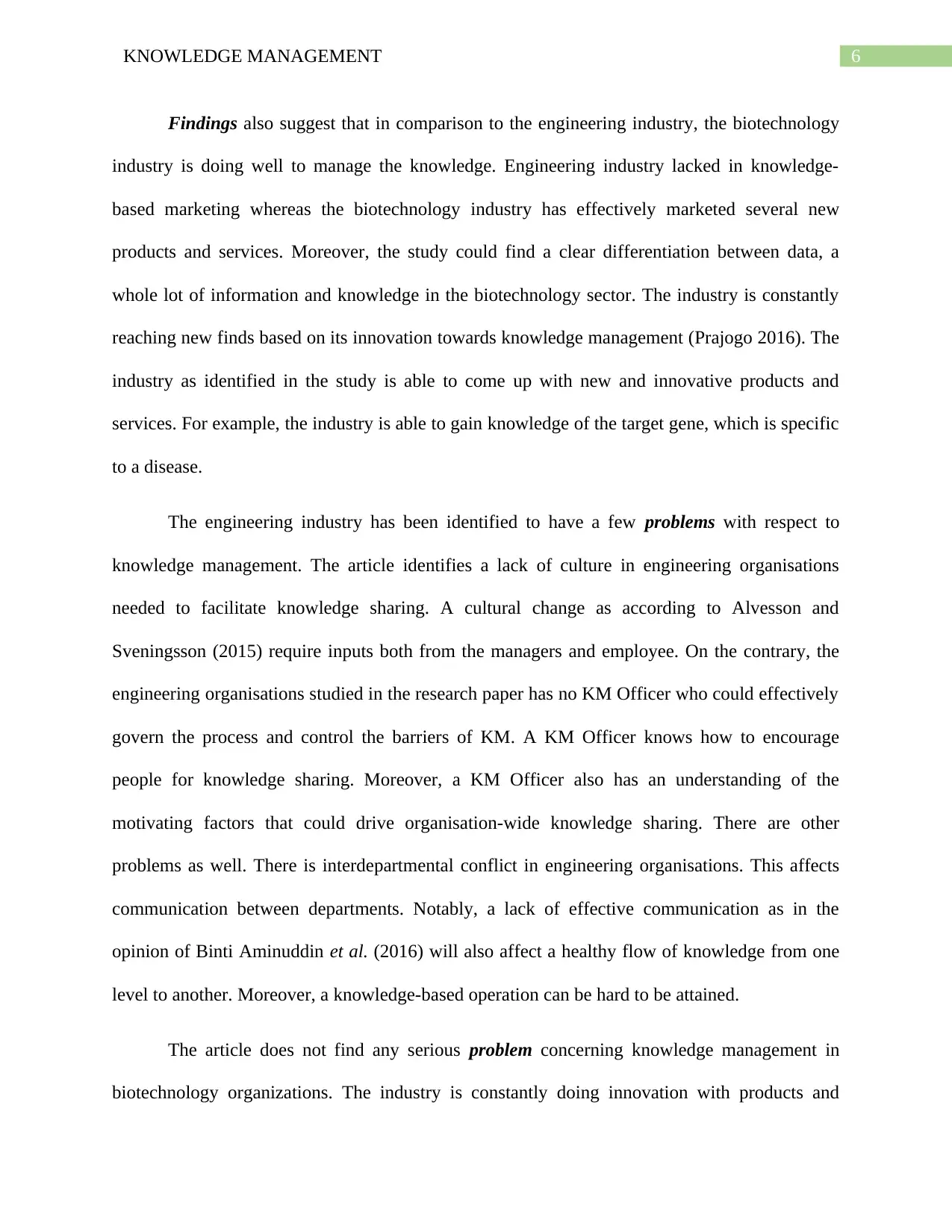
6KNOWLEDGE MANAGEMENT
Findings also suggest that in comparison to the engineering industry, the biotechnology
industry is doing well to manage the knowledge. Engineering industry lacked in knowledge-
based marketing whereas the biotechnology industry has effectively marketed several new
products and services. Moreover, the study could find a clear differentiation between data, a
whole lot of information and knowledge in the biotechnology sector. The industry is constantly
reaching new finds based on its innovation towards knowledge management (Prajogo 2016). The
industry as identified in the study is able to come up with new and innovative products and
services. For example, the industry is able to gain knowledge of the target gene, which is specific
to a disease.
The engineering industry has been identified to have a few problems with respect to
knowledge management. The article identifies a lack of culture in engineering organisations
needed to facilitate knowledge sharing. A cultural change as according to Alvesson and
Sveningsson (2015) require inputs both from the managers and employee. On the contrary, the
engineering organisations studied in the research paper has no KM Officer who could effectively
govern the process and control the barriers of KM. A KM Officer knows how to encourage
people for knowledge sharing. Moreover, a KM Officer also has an understanding of the
motivating factors that could drive organisation-wide knowledge sharing. There are other
problems as well. There is interdepartmental conflict in engineering organisations. This affects
communication between departments. Notably, a lack of effective communication as in the
opinion of Binti Aminuddin et al. (2016) will also affect a healthy flow of knowledge from one
level to another. Moreover, a knowledge-based operation can be hard to be attained.
The article does not find any serious problem concerning knowledge management in
biotechnology organizations. The industry is constantly doing innovation with products and
Findings also suggest that in comparison to the engineering industry, the biotechnology
industry is doing well to manage the knowledge. Engineering industry lacked in knowledge-
based marketing whereas the biotechnology industry has effectively marketed several new
products and services. Moreover, the study could find a clear differentiation between data, a
whole lot of information and knowledge in the biotechnology sector. The industry is constantly
reaching new finds based on its innovation towards knowledge management (Prajogo 2016). The
industry as identified in the study is able to come up with new and innovative products and
services. For example, the industry is able to gain knowledge of the target gene, which is specific
to a disease.
The engineering industry has been identified to have a few problems with respect to
knowledge management. The article identifies a lack of culture in engineering organisations
needed to facilitate knowledge sharing. A cultural change as according to Alvesson and
Sveningsson (2015) require inputs both from the managers and employee. On the contrary, the
engineering organisations studied in the research paper has no KM Officer who could effectively
govern the process and control the barriers of KM. A KM Officer knows how to encourage
people for knowledge sharing. Moreover, a KM Officer also has an understanding of the
motivating factors that could drive organisation-wide knowledge sharing. There are other
problems as well. There is interdepartmental conflict in engineering organisations. This affects
communication between departments. Notably, a lack of effective communication as in the
opinion of Binti Aminuddin et al. (2016) will also affect a healthy flow of knowledge from one
level to another. Moreover, a knowledge-based operation can be hard to be attained.
The article does not find any serious problem concerning knowledge management in
biotechnology organizations. The industry is constantly doing innovation with products and
Paraphrase This Document
Need a fresh take? Get an instant paraphrase of this document with our AI Paraphraser
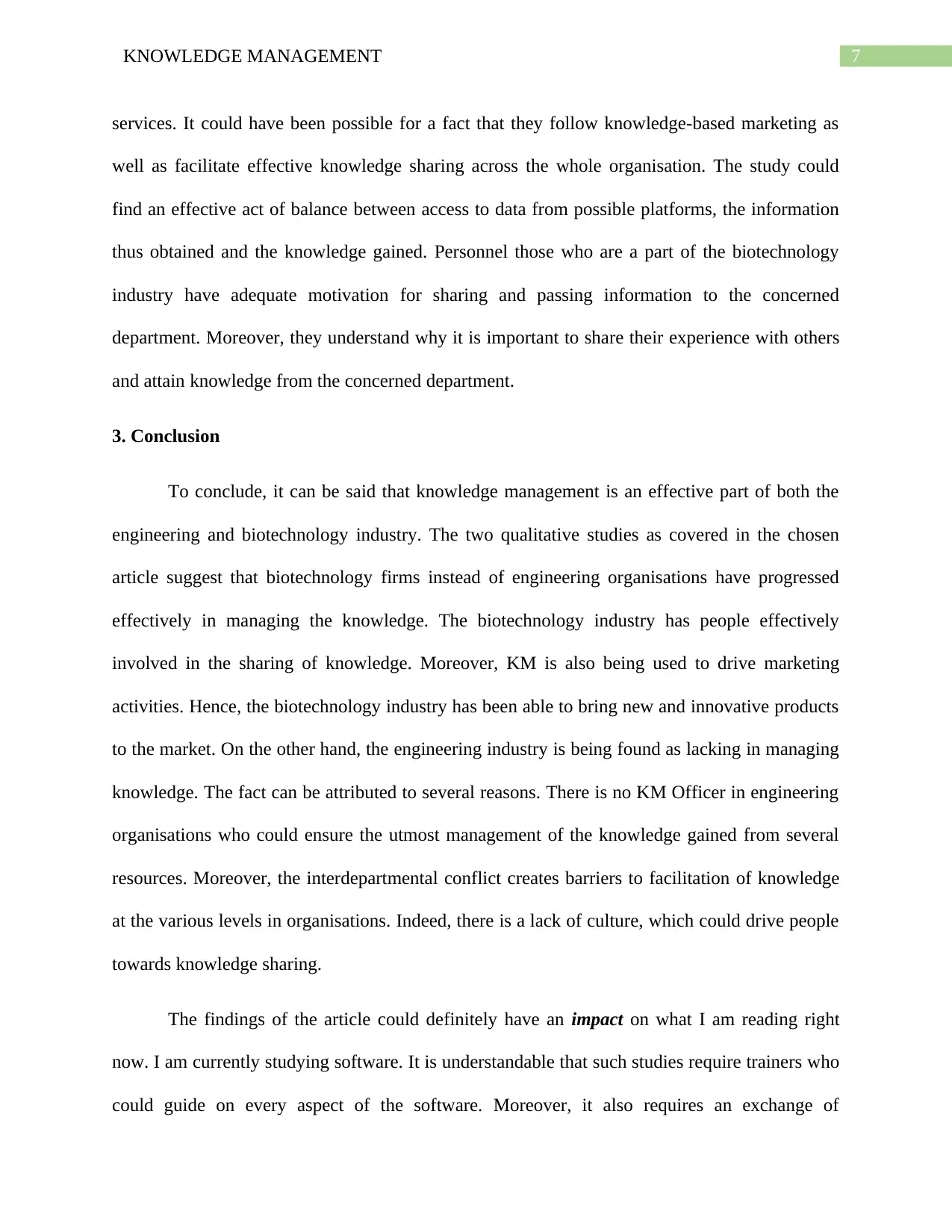
7KNOWLEDGE MANAGEMENT
services. It could have been possible for a fact that they follow knowledge-based marketing as
well as facilitate effective knowledge sharing across the whole organisation. The study could
find an effective act of balance between access to data from possible platforms, the information
thus obtained and the knowledge gained. Personnel those who are a part of the biotechnology
industry have adequate motivation for sharing and passing information to the concerned
department. Moreover, they understand why it is important to share their experience with others
and attain knowledge from the concerned department.
3. Conclusion
To conclude, it can be said that knowledge management is an effective part of both the
engineering and biotechnology industry. The two qualitative studies as covered in the chosen
article suggest that biotechnology firms instead of engineering organisations have progressed
effectively in managing the knowledge. The biotechnology industry has people effectively
involved in the sharing of knowledge. Moreover, KM is also being used to drive marketing
activities. Hence, the biotechnology industry has been able to bring new and innovative products
to the market. On the other hand, the engineering industry is being found as lacking in managing
knowledge. The fact can be attributed to several reasons. There is no KM Officer in engineering
organisations who could ensure the utmost management of the knowledge gained from several
resources. Moreover, the interdepartmental conflict creates barriers to facilitation of knowledge
at the various levels in organisations. Indeed, there is a lack of culture, which could drive people
towards knowledge sharing.
The findings of the article could definitely have an impact on what I am reading right
now. I am currently studying software. It is understandable that such studies require trainers who
could guide on every aspect of the software. Moreover, it also requires an exchange of
services. It could have been possible for a fact that they follow knowledge-based marketing as
well as facilitate effective knowledge sharing across the whole organisation. The study could
find an effective act of balance between access to data from possible platforms, the information
thus obtained and the knowledge gained. Personnel those who are a part of the biotechnology
industry have adequate motivation for sharing and passing information to the concerned
department. Moreover, they understand why it is important to share their experience with others
and attain knowledge from the concerned department.
3. Conclusion
To conclude, it can be said that knowledge management is an effective part of both the
engineering and biotechnology industry. The two qualitative studies as covered in the chosen
article suggest that biotechnology firms instead of engineering organisations have progressed
effectively in managing the knowledge. The biotechnology industry has people effectively
involved in the sharing of knowledge. Moreover, KM is also being used to drive marketing
activities. Hence, the biotechnology industry has been able to bring new and innovative products
to the market. On the other hand, the engineering industry is being found as lacking in managing
knowledge. The fact can be attributed to several reasons. There is no KM Officer in engineering
organisations who could ensure the utmost management of the knowledge gained from several
resources. Moreover, the interdepartmental conflict creates barriers to facilitation of knowledge
at the various levels in organisations. Indeed, there is a lack of culture, which could drive people
towards knowledge sharing.
The findings of the article could definitely have an impact on what I am reading right
now. I am currently studying software. It is understandable that such studies require trainers who
could guide on every aspect of the software. Moreover, it also requires an exchange of

8KNOWLEDGE MANAGEMENT
information between the peers, so that, innovative thoughts could be shared leading to informed
progress towards the software study. The tutor under whom I am currently studying the software
should facilitate KM in the group. Moreover, there should be a culture of KM to effectively
facilitate the sharing of information.
information between the peers, so that, innovative thoughts could be shared leading to informed
progress towards the software study. The tutor under whom I am currently studying the software
should facilitate KM in the group. Moreover, there should be a culture of KM to effectively
facilitate the sharing of information.
⊘ This is a preview!⊘
Do you want full access?
Subscribe today to unlock all pages.

Trusted by 1+ million students worldwide
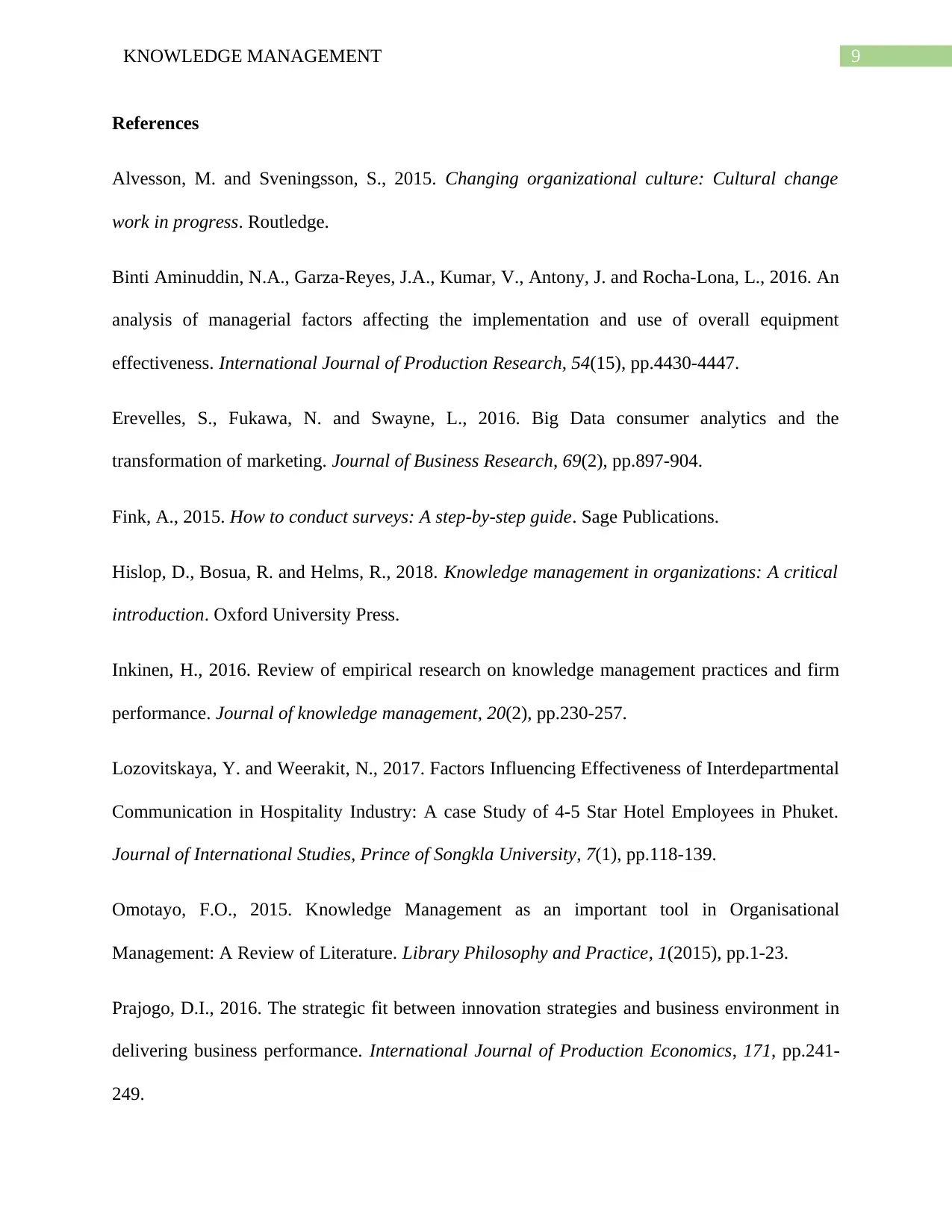
9KNOWLEDGE MANAGEMENT
References
Alvesson, M. and Sveningsson, S., 2015. Changing organizational culture: Cultural change
work in progress. Routledge.
Binti Aminuddin, N.A., Garza-Reyes, J.A., Kumar, V., Antony, J. and Rocha-Lona, L., 2016. An
analysis of managerial factors affecting the implementation and use of overall equipment
effectiveness. International Journal of Production Research, 54(15), pp.4430-4447.
Erevelles, S., Fukawa, N. and Swayne, L., 2016. Big Data consumer analytics and the
transformation of marketing. Journal of Business Research, 69(2), pp.897-904.
Fink, A., 2015. How to conduct surveys: A step-by-step guide. Sage Publications.
Hislop, D., Bosua, R. and Helms, R., 2018. Knowledge management in organizations: A critical
introduction. Oxford University Press.
Inkinen, H., 2016. Review of empirical research on knowledge management practices and firm
performance. Journal of knowledge management, 20(2), pp.230-257.
Lozovitskaya, Y. and Weerakit, N., 2017. Factors Influencing Effectiveness of Interdepartmental
Communication in Hospitality Industry: A case Study of 4-5 Star Hotel Employees in Phuket.
Journal of International Studies, Prince of Songkla University, 7(1), pp.118-139.
Omotayo, F.O., 2015. Knowledge Management as an important tool in Organisational
Management: A Review of Literature. Library Philosophy and Practice, 1(2015), pp.1-23.
Prajogo, D.I., 2016. The strategic fit between innovation strategies and business environment in
delivering business performance. International Journal of Production Economics, 171, pp.241-
249.
References
Alvesson, M. and Sveningsson, S., 2015. Changing organizational culture: Cultural change
work in progress. Routledge.
Binti Aminuddin, N.A., Garza-Reyes, J.A., Kumar, V., Antony, J. and Rocha-Lona, L., 2016. An
analysis of managerial factors affecting the implementation and use of overall equipment
effectiveness. International Journal of Production Research, 54(15), pp.4430-4447.
Erevelles, S., Fukawa, N. and Swayne, L., 2016. Big Data consumer analytics and the
transformation of marketing. Journal of Business Research, 69(2), pp.897-904.
Fink, A., 2015. How to conduct surveys: A step-by-step guide. Sage Publications.
Hislop, D., Bosua, R. and Helms, R., 2018. Knowledge management in organizations: A critical
introduction. Oxford University Press.
Inkinen, H., 2016. Review of empirical research on knowledge management practices and firm
performance. Journal of knowledge management, 20(2), pp.230-257.
Lozovitskaya, Y. and Weerakit, N., 2017. Factors Influencing Effectiveness of Interdepartmental
Communication in Hospitality Industry: A case Study of 4-5 Star Hotel Employees in Phuket.
Journal of International Studies, Prince of Songkla University, 7(1), pp.118-139.
Omotayo, F.O., 2015. Knowledge Management as an important tool in Organisational
Management: A Review of Literature. Library Philosophy and Practice, 1(2015), pp.1-23.
Prajogo, D.I., 2016. The strategic fit between innovation strategies and business environment in
delivering business performance. International Journal of Production Economics, 171, pp.241-
249.
1 out of 10
Related Documents
Your All-in-One AI-Powered Toolkit for Academic Success.
+13062052269
info@desklib.com
Available 24*7 on WhatsApp / Email
![[object Object]](/_next/static/media/star-bottom.7253800d.svg)
Unlock your academic potential
Copyright © 2020–2026 A2Z Services. All Rights Reserved. Developed and managed by ZUCOL.





